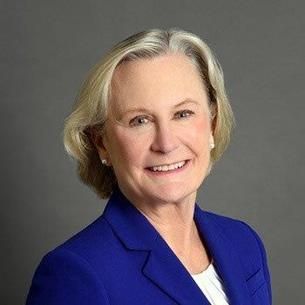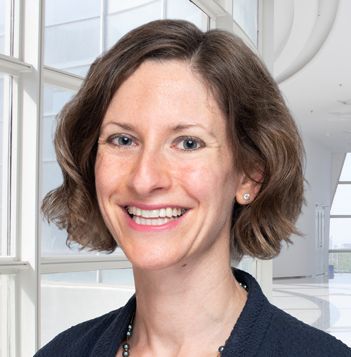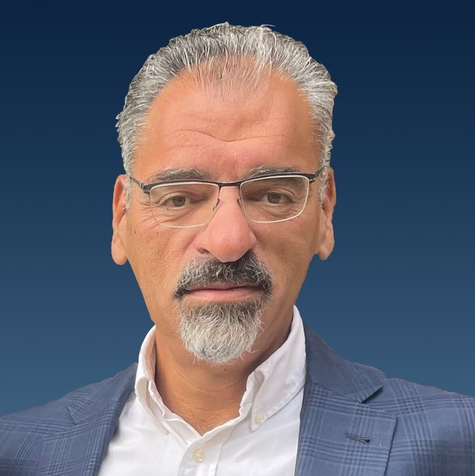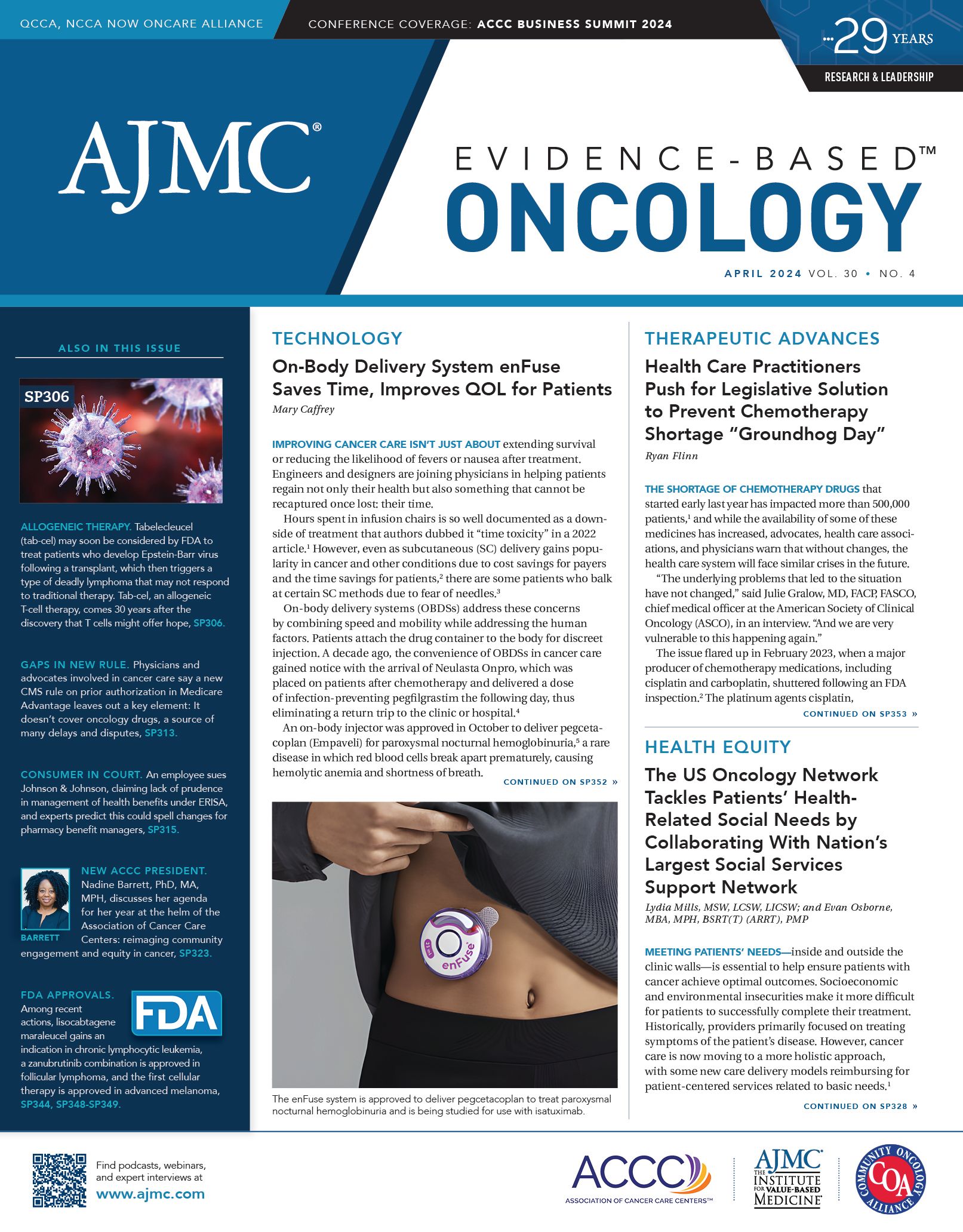- Center on Health Equity & Access
- Clinical
- Health Care Cost
- Health Care Delivery
- Insurance
- Policy
- Technology
- Value-Based Care
Health Care Practitioners Push for Legislative Solution to Prevent Chemotherapy Shortage “Groundhog Day”
The shortage of chemotherapy drugs that started early last year has impacted more than 500,000 patients,1 and while the availability of some of these medicines has increased, advocates, health care associations, and physicians warn that without changes, the health care system will face similar crises in the future.
Julie Gralow, MD, FACP, FASCO | Image credit: ASCO

“The underlying problems that led to the situation have not changed,” said Julie Gralow, MD, FACP, FASCO, chief medical officer at the American Society of Clinical Oncology (ASCO), in an interview. “And we are very vulnerable to this happening again.”
The issue flared up in February 2023, when a major producer of chemotherapy medications, including cisplatin and carboplatin, shuttered following an FDA inspection.2 The platinum agents cisplatin, first approved in the US in 1978, and carboplatin, approved in 1989,3,4 are used to treat a broad range of cancers and are critical components for clinical trials that rely on the medications for comparator arms. Currently, ClinicalTrials.gov lists more than 1000 active studies using cisplatin5 and another 1000 relying on carboplatin.6
ASCO offered its own suggestions for how physicians could deal with shortages, with a report in November, “Drug Shortages in Oncology: ASCO Clinical Guidance for Alternative Treatments,”1 that included reprioritizing nonessential use of chemotherapy agents, increasing the time between dosing cycles, or reducing a patient’s total treatment doses. The report also suggested oncologists explore alternative evidence-based regimens and clinical trials when supplies of the standard of care drugs are unavailable.
Jacob Reibel, MD | Image credit: Penn Medicine

These strategies can help prevent “the heartbreaking situation of not being able to offer a patient curative treatment for his or her cancer,” said Jacob Reibel, MD, hematology and oncologyfellow at the Hospital of the University of Pennsylvania. Still, he said, “it certainly affected the way we practice.”
“We've been fortunate enough not to have to do serious rationing. We could still offer patients chemotherapies appropriate for their cancer type,” said Reibel.
For example, Reibel described a situation where a patient had relapsed diffuse large B-cell non-Hodgkin lymphoma. This patient might have typically received a common salvage chemotherapy treatment called RICE, or rituximab, ifosfamide, carboplatin, and etoposide. However, the shortage of carboplatin prompted the oncology team to substitute with mitoxantrone, or RIME). Although this combination is also effective, he said, “It’s hard to say whether or not the outcome changed by making that substitution, but certainly it wouldn’t have been the first choice had there been more carboplatin available.”
At other times, physicians were able to substitute new therapies. In December 2023, the FDA approved Astellas Pharma’s enfortumab vedotin (Padcev) with pembrolizumab (Keytruda) for locally advanced or metastatic urothelial cancer,7 after clinical trials showed the combination nearly doubled overall survival and progression-free survival. This combination of antibody-drug conjugate (ADC) with a PD-1 inhibitor is the first approved alternative to the first-line standard of care treatment of platinum-containing chemotherapy. Notably, the FDA action came 5 months ahead of the original approval deadline.8
Although the FDA’s swiftness gave clinicians a new option, it raised important questions, which were noted in an editorial that appeared with the full data for enfortumab vedotin in the New England Journal of Medicine.9,10 Given the improved outcomes, “this trial should be considered a hallmark,” the authors wrote. However, “the economic aspects of treatment…cannot be ignored,” since an ADC followed by pembrolizumab costs 3.8 times more than chemotherapy followed by avelumab.
Last year was an active one for the regulatory agency, which approved 55 new molecular entities,11 the most since 2018. The list included 13 treatments for various types of cancer, including colorectal, lung, low-grade gliomas, and prostate.12 In addition, the agency approved expanded use for 67 other oncology medicines already on the market. These new drug approvals included talquetamab-tgvs injection (Talvey) for refractory or relapsed multiple myeloma13; nirogacestat (Ogsiveo), the first approved drug for desmoid tumors14; and capivasertib (Truqap) with fulvestrant for certain types of breast cancer.15
Erin R. Fox, PharmD | Image credit: University of Utah

“Certainly, newer drugs can help, but the standard of care medications are critical,” said Erin R. Fox, PharmD, associate chief pharmacy officer, University of Utah School of Medicine. This is true not just for patients already on treatment but also for clinical trials trying to demonstrate superiority to existing approved drugs. A similar shortage a decade ago stalled development of several therapies, Fox said.
Elizabeth Guancial, MD | Image credit: FCS

“When the shortage came out, unfortunately, many of our studies that were relying on platinum drugs as a standard of care arm were temporarily halted,” said Elizabeth Guancial, MD, an oncologist and hematologist with Florida Cancer Specialists & Research Institute in Sarasota County. “You’re not able to study something newer that may be better because you don’t have the standard of care available. It just slows down the whole machinery, unfortunately.”
Yoram Unguru, MD, MS, MA | Image credit: Johns Hopkins

“As a pediatric oncologist, I’m optimistic by design, but I’m also data driven and evidence based,” said Yoram Unguru, MD, MS, MA, a pediatric hematologist-oncologist at the Herman and Walter Samuelson Children’s Hospital at Sinai and core faculty at the Johns Hopkins Berman Institute of Bioethics. “It’s Groundhog Day all over again. I’ve seen this movie; I know how this ends. That’s the pragmatist in me.”
He said while 85% of pediatric cancers can be cured, that
figure is dependent on having standard chemotherapies available. With the shortages, his ability to provide ideal outcomes for patients is limited.
“It is very rare that we have alternative treatments, so that’s the answer, to be brutally honest,” Unguru said. “But we can’t be paralyzed by this. These drug shortages are not an act of God. These are business decisions and quality control issues.”
Several government agencies and political bodies have offered suggestions. The Senate Finance Committee published a white paper in January on potential legislative solutions to alleviate future shortages, including reforms to Medicare payments and drug rebate programs, as well as incentives for hospitals to prepare mitigation plans ahead of time for shortages.17
The white paper notes that 77 generic sterile injectables, including saline, morphine, cancer therapies, anesthesia, and hormones, were in shortage last year. More broadly, these sterile injectables were responsible for 63% of drug shortages from 2013 to 2017, according to the FDA. The FDA’s website lists 16 oncology drugs that are currently in shortage, still including cisplatin and carboplatin injections.18
Years of ongoing shortages of bacillus Calmette-Guérin, an immunotherapy used to treat bladder cancer, required clinicians to look for alternative treatments, including ones with limited data on efficacy, said Ruchika Talwar, MD, clinical instructor, Urologic Oncology Fellowship at Vanderbilt University Medical Center.
“We were forced to lean on things that there was some evidence for, but not necessarily great evidence for,” said Talwar. “When we have to be reactive, it’s really hard to counsel patients with concrete numbers that are in the literature.”
Ruchika Talwar, MD | Image credit: VUMC

Talwar, who worked in a congressional office last summer during the peak of the shortage, said many constituents were contacting representatives’ offices to complain about its effects.
“There was a patient who had ovarian cancer who was affected by the platinum shortage, and the first-line therapy was in short supply, and then because of that she wrote in that the second-line therapy was also in short supply,” Talwar said.
Last June, the House Energy and Commerce Committee’s Subcommittee on Health held a hearing on “legislative solutions to bolster preparedness and response for all hazards and public health security threats,” including the chemotherapy shortage. Several bills were introduced to alleviate the crisis; legislation would have empowered the FDA to demand manufacturers’ data on whether drugs had a longer shelf life19; drug makers would have been required to file quarterly reports on supplies and ingredient sources, which would provide insight into potential shortages.20 No bills were passed, however.
“It’s going to be an ongoing problem, and that’s why I’m really hoping that we can come up with more long-term systemic changes to address the cause and not just put Band-Aids on bullet holes as we continue to face these,” Talwar said.
The shortage will be a prominent topic at ASCO’s annual conference to be held in June in Chicago, the largest gathering of oncologists in the world. Gralow herself will lead a session titled “Solving Decades of Drug Shortages in Oncology: What, Who, and When?”
“If I look at my crystal ball for what’s going to happen in the next year, there’ll be a lot of talk at the legislative and regulatory level,” Gralow said. “This is a bipartisan issue, but it’s a complicated time right now in getting things passed.”
References
1. Santos ES, Oliver TK, Lacchetti C, et al. Drug shortages in oncology: ASCO clinical guidance for alternative treatments. JCO Oncol Pract. 2024;20(1):19-32. doi:10.1200/OP.23.00545
2. Gilbert D. How troubles at a factory in India led to a US cancer drug shortage. The Washington Post. June 27, 2023. Accessed March 22, 2024. https://wapo.st/3VtCcYT
3. The “accidental” cure—platinum-based treatment for cancer: the discovery of cisplatin. National Cancer Institute. May 30, 2014. Accessed May 22, 2024. https://www.cancer.gov/research/progress/discovery/cisplatin
4. Monneret C. Platinum anticancer drugs: from serendipity to rational design. Ann Pharm Fr. 2011;69(6):286-295. doi:10.1016/j.pharma.2011.10.001
5. Search results for cisplatin. ClinicalTrials.gov. March 21, 2024. https://clinicaltrials.gov/search?intr=cisplatin&aggFilters=status:rec%20act,studyType:int%20exp
6. Search results for carboplatin. ClinicalTrials.gov. March 21, 2024. https://clinicaltrials.gov/search?intr=carboplatin&aggFilters=status:rec%20act,studyType:int%20exp
7. FDA approves enfortumab vedotin-ejfv with pembrolizumab for locally advanced or metastatic urothelial cancer. FDA. December 15, 2023. Accessed March 21, 2024. https://www.fda.gov/drugs/resources-information-approved-drugs/fda-approves-enfortumab-vedotin-ejfv-pembrolizumab-locally-advanced-or-metastatic-urothelial-cancer
8. Dunleavy K. Merck, Astellas, and Pfizer bring down the house with Keytruda-Padcev FDA nod in bladder cancer. Fierce Pharma. December 18, 2023. Accessed March 22, 2024. https://www.fiercepharma.com/pharma/merck-astellas-pfizer-bring-down-house-keytruda-padcev-fda-nod-bladder-cancer
9. Powles T, Valderrama BP, Gupta S, et al; EV-301 Trial Investigators. Enfortumab vedotin and pembrolizumab in untreated advanced urothelial cancer. N Engl J Med. 2024;390(10):875-888. doi:10.1056/NEJMoa2312117
10. Niegisch G. Enfortumab vedotin and pembrolizumab—a new perspective on urothelial cancer. N Engl J Med. 2024;390(10):944-946. doi:10.1056/NEJMe2400311
11. Novel drug approvals for 2023. FDA. March 22, 2024. Accessed March 22, 2024. https://www.fda.gov/drugs/new-drugs-fda-cders-new-molecular-entities-and-new-therapeutic-biological-products/novel-drug-approvals-2023
12. Oncology regulatory review 2023. FDA. March 5, 2024. Accessed March 21, 2024. https://www.fda.gov/about-fda/2023-oce-annual-report/oncology-regulatory-review-2023
13. FDA grants accelerated approval to talquetamab-tgvs for relapsed or refractory multiple myeloma. FDA. August 10, 2023. Accessed March 21, 2024. https://www.fda.gov/drugs/resources-information-approved-drugs/fda-grants-accelerated-approval-talquetamab-tgvs-relapsed-or-refractory-multiple-myeloma
14. FDA approves nirogacestat for desmoid tumors. FDA. November 28, 2023. Accessed March 21, 2024. https://www.fda.gov/drugs/resources-information-approved-drugs/fda-approves-nirogacestat-desmoid-tumors
15. FDA approves capivasertib with fulvestrant for breast cancer. FDA. November 16, 2023. Accessed March 21, 2024. https://www.fda.gov/drugs/resources-information-approved-drugs/fda-approves-capivasertib-fulvestrant-breast-cancer
16. Severity and impact of current drug shortages. American Society of Health-System Pharmacists. August 10, 2023. Accessed March 21, 2024. https://news.ashp.org/-/media/assets/drug-shortages/docs/ASHP-2023-Drug-Shortages-Survey-Report.pdf
17. Preventing and mitigating generic drug shortages: policy options under federal health programs. Senate Committee on Finance. January 25, 2024. Accessed March 21, 2024. https://www.finance.senate.gov/imo/media/doc/white_paper_preventing_drug_shortages.pdf
18. FDA drug shortages. FDA. Accessed March 21, 2024. https://www.accessdata.fda.gov/scripts/drugshortages/default.cfm
19. Ensuring Access to Lifesaving Drugs Act of 2023, HR 3793, 118th Cong (2023). Accessed March 21, 2024. https://www.congress.gov/bill/118th-congress/house-bill/3793/
20. Drug Origin Transparency Act of 2023, HR 3810, 118th Cong (2023). Accessed March 21, 2024. https://www.congress.gov/bill/118th-congress/house-bill/3810/text

Addressing Financial Toxicity With Navigators and Better Conversations Around Decision Making
June 5th 2018Financial toxicity impacts a lot more than a patient's finances—it leads to nonadherence and poorer health outcomes. Financial navigators are increasingly being used to be proactive about addressing high healthcare costs and the resulting financial toxicity.
Listen
